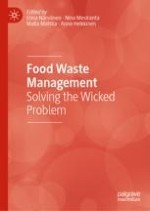2020 | OriginalPaper | Buchkapitel
6. Distributed Agency in Food Waste—A Focus on Non-human Actors in Retail Setting
verfasst von : Lotta Alhonnoro, Hanna Leipämaa-Leskinen, Henna Syrjälä
Erschienen in: Food Waste Management
Aktivieren Sie unsere intelligente Suche, um passende Fachinhalte oder Patente zu finden.
Wählen Sie Textabschnitte aus um mit Künstlicher Intelligenz passenden Patente zu finden. powered by
Markieren Sie Textabschnitte, um KI-gestützt weitere passende Inhalte zu finden. powered by
